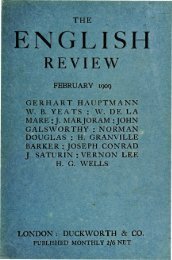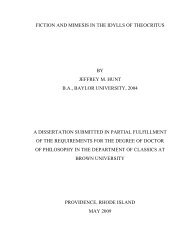View PDF - Brown University Library
View PDF - Brown University Library
View PDF - Brown University Library
- No tags were found...
You also want an ePaper? Increase the reach of your titles
YUMPU automatically turns print PDFs into web optimized ePapers that Google loves.
A Typical MunicipalBond OfferingTo finance important public improvements,such as paving streets,erecting bath houses, fire departmentbuildings, electric lightplants, etc., the City of Cleveland,Ohio, has issued $2,680,000 ofMunicipal Bonds.These bonds by reason of theirexemption from the Federal IncomeTax, including surtaxes, netthe investor a liberal return. Theyare in coupon form, $1000. denominations,and mature seriallyfrom 1920 to 1969 inclusive.The assessed valuation of taxableproperty in Cleveland is $1,298,-048,920. Cleveland's net bondeddebt is $46,165,407 including thisissue.Thus, the security (Clevelandtaxable property) is approximately30 times the amount ofthe city's debt.While these bonds will doubtlessbe absorbed immediately by investors,we are constantly underwritingother well-secured, taxfree issues to net the investorfrom 4' 4' (to 534%.Write for our current offeringsand for booklet "Investing inMunicipal Bonds,"STACY & BRAUNINVESTMENTBONDS'Second National Bank BuildingNew York Toledo CincinnatiTime to Stock Up?Prices are beginning to drop.How low will they go this year?How far ahead should you buy commodities?Babson's Reports giveyou the right cue.Particulars free. Write Dept. H-41.Babson's Statistical OrganizationEngineering Bldg.Wellesley Hills, Mass.Largest Organiiation of its Character in the WorldFinancial Situation, continued from page 64But he immediately added: "The difficulty i|that the money, so long as it remains in the country of origin, is of very little use for the purpose;services, or their equivalent in. our own cunNow Germany's actual gold holdings, all toldhad declined in May below $400,000,000, and i\very great part of that will soon have gone out 0a natural recourse, in making the initial cash'payment, for the German government to acquiresuch sound securities of other nations as Germaninvestors still hold, and to ship those securities tcthe Allied markets, where they might either besold for cash or used as collateral on loans throughcourse when, in the early years of the war, the>being issued in America and which were dealt iron our Stock Exchange, there was at one time ordeposit as security in New York no less tharada, Argentina, Chili, Norway, Sweden, Denmark, Switzerland, Holland, Cuba, India, Newties from their owners, or bought them witr]ing them to the government through a highl>|come from such securities and exacted from thosesimilar securities are still in the hands of Germaninvestors, and therefore similarly obtainable b\cial inquiry, conducted by experts of the GermanGerman people's holdings of foreign securitieswere at that time "rather considerably abovethan under 16,000,000,000 marks"; or, roughly,near correct, it would warrant Doctor Helfferich'sestimate of 1913 that the total holdings, in thatyear immediately before the war, were not farbelow 20,000,000,000 marks, or $5,000,000,000.Such a total, just before the war, would haveman hands to-day as the full initial cash paymenton the war indemnity—this even after allowancehas been made for Germany's enormous sales ofof an indemnity. The crux is to get it out 01Germany. We do not want payment in papemarks. We want to be paid in gold, in goods 0rency."Germany, merely to pay for food. It would biwhich the cash might be procured. This wouldbe no new experiment. The governments ojFrance and England adopted exactly that rewere borrowing in our markets. Against theshort-term British war-loans which were ther$060,000,000 worth of railway and municipasecurities or bonds of such governments as CanZealand, Japan, and the United States itself. TheBritish Exchequer had either borrowed the securiBritish government bonds. France had $213000,000 worth of similar securities similarlj|pledged in the New York market.In each case, the English or French holders 0those securities were coerced into selling or lenddiscriminatory income tax, imposed on the inwho refused to give them up. How much oithe German government, is a much-disputecquestion. That Germany since 1871 has been avery large investor in the foreign markets is perfectly well known. Fourteen years ago an offigovernment, arrived at the estimate that the$4,000,000,000. If that estimate was anywhereinsured the existence of nearly as much in GerFinancial Situation, continued on page 6866










